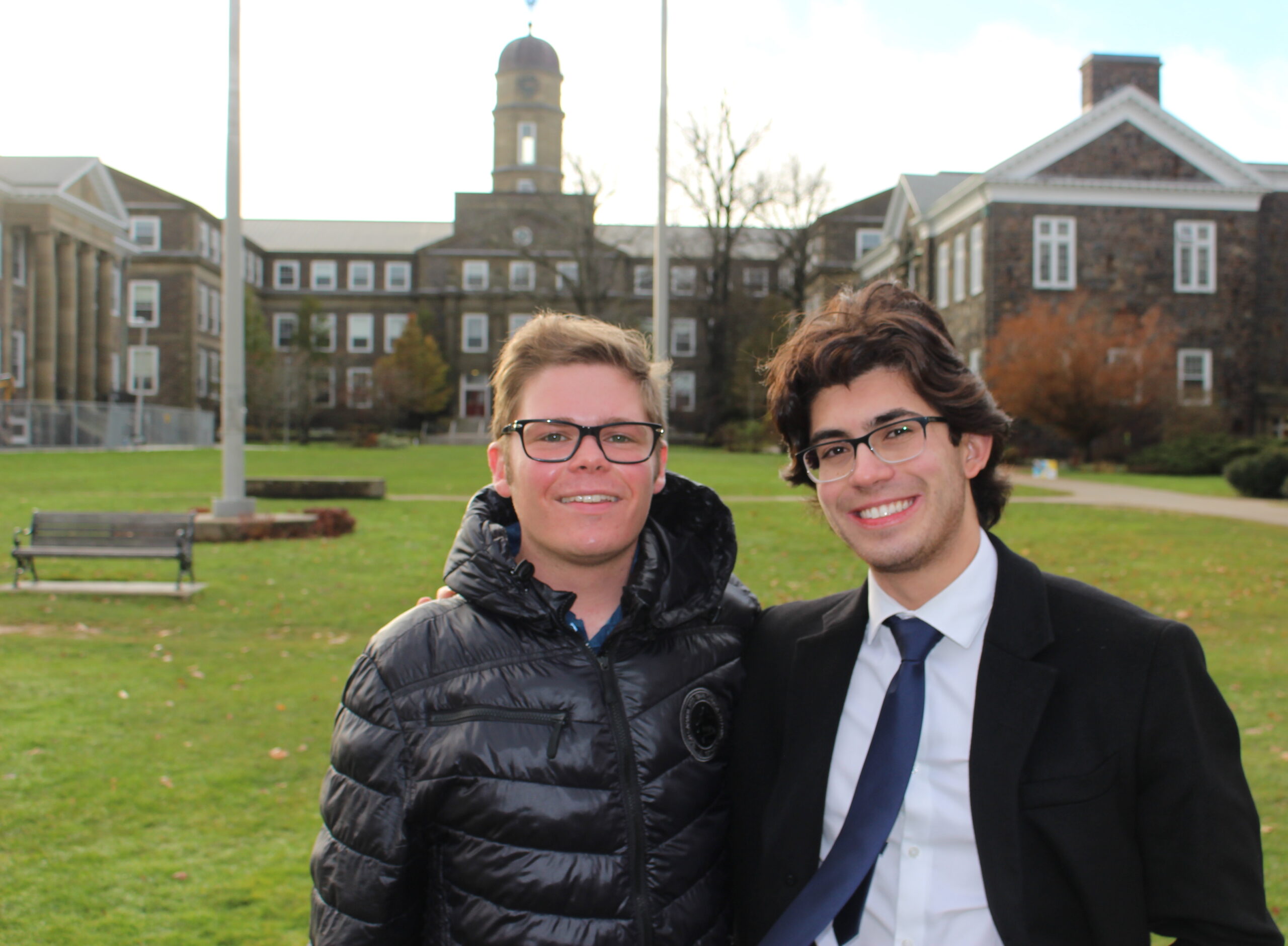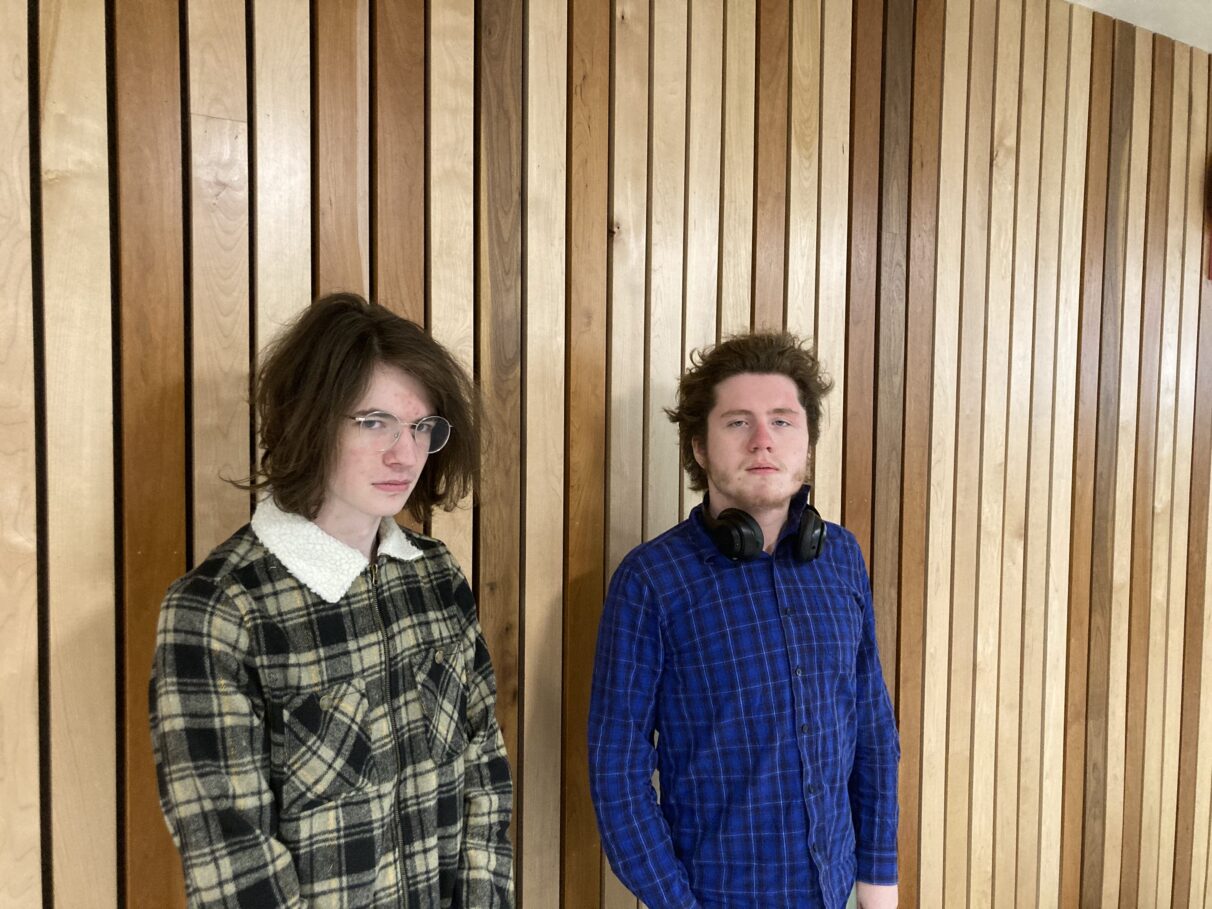Political societies return to Dalhousie campus
NDP and Conservative clubs want students to get interested in political parties again

caption
Dalhousie Conservatives Evan Colclough (left) and Kai Jassal pose on campus. The two political science majors invite even the most apolitical of students to get involved with their events.Party-affiliated societies are back, and they’re attempting the impossible: getting students to vote.
After extended periods of inactivity, the Dalhousie Conservatives and Dalhousie Young New Democrats have new blood. Both are working to cultivate interest in party politics on campus.
This term, the Conservative society hosted a potluck open to all with Nova Scotia Young PCs, the youth arm of the provincial Conservative party. Their NDP counterparts brought in Halifax MLA Gary Burrill to chat with students for their first general meeting. The new NDP society has attracted 20 members, and the Conservatives have hit 25.
Evan Colclough, the Conservative society’s president, says growing civic awareness on campus is a big goal for the society.
“Civic participation is always better,” he said. “It’s better for students, it’s better for the country, it’s better at every level.”
The NDP society’s president, Nate Mahoney, was inspired to get more involved after realizing how much formal politics affect student life.
“I’ve never been really involved in party politics, and in fact, I was kind of cynical about the whole thing,” Mahoney said. “What really changed was: I ran for the DSU. I sat on the student union for a couple of months, and I realized that basically everything stemmed from the fact that the university doesn’t have enough funding.”
Interest in party politics has been waning steadily at Dalhousie. Kai Jassal, who is vice-president of the Conservative society, says the club used to have a robust membership in the ‘80s, but interest has gradually tapered off since then.
By 2020, the pandemic made managing the society untenable. The NDP club’s treasurer, Alfonso Abraham, said COVID-19 played a similar role in the decline of their society.

caption
Nate Mahoney (left) and Alfonso Abraham are the founders of the Dalhousie Young New Democrats. The two hope to persuade anti-establishment students who lean left to reconsider their suspicion of political parties.The once-popular Dalhousie Liberal Society has also collapsed in recent years.
Declining interest in party-affiliated societies coincides with poor provincial election turnouts among Nova Scotian youth in recent years.
According to Elections Nova Scotia, the province’s past two elections have had the lowest turnouts in provincial history at 53 per cent in 2017 and 55 per cent in 2021. Only a quarter of Nova Scotians between the ages of 18 and 24 voted in 2021, which means the demographic only constituted five per cent of the people who voted in that election.
Dalhousie political science professor David Black says this trend can be explained by young people’s skepticism about what parties can get done.
“They feel that the formal political process has very little promise or little possibility for making the kinds of steps that they are interested in seeing.”
Black says the internet has a large role to play as well. Before social media, Black says, audiences got their news from fewer sources, meaning voters were mostly aware of the same issues. They were also more closely aligned with one another, which made it easier for parties to keep track of public opinion.
“We had all kinds of media institutional structures that drove people towards a common view,” Black said. “There were a relatively small number of venues where people were engaged in the same kinds of issues.”
Now, Black says, the internet personalizes everyone’s news feed, meaning different readers are hearing about completely different issues. The professor says potential voters can’t even agree on what to talk about, much less on what do about it.
“You don’t get the same kind of tendency towards coherence around even what issues really matter,” Black said. “You tend to be channeled towards sources of information and communities of interest that share very strongly certain particular bents that no political party seems to adequately represent.”
Nate Mahoney of the Dalhousie NDP says the internet has changed student civic engagement for the worse. He says the internet can scratch a student’s itch for political involvement without demanding much in return.
“There’s this disconnect between the online activism and the real activism,” Mahoney said. “I think that’s kind of filled people’s taste for politics, without actually creating the actual social infrastructure that needs to exist to effect change.”
Black says student activism has just changed focus.
“I think that we need to be very careful, because I don’t think it means that young people are de-politicized or disinterested in politics,” he said. “They tend to be engaged politically, much more so than in the past, in what we call civil society: organizations, groups that exist outside the formal political process.”
Both the provincial NDP and PC parties are eager to support their respective societies, though the Conservative club aligns itself more with the federal party, with whom they are ratified.
Lauren Skabar, membership and outreach co-ordinator with the Nova Scotia NDP, said the increased interest is good news.
“It’s always exciting when young folks want to be involved, and especially when they reach out to us,” she said. “It’s nice to have people who are living these experiences that can help us shape policies that are impacting them directly.”
Scott Ellis, president of Nova Scotia Young Progressive Conservatives, agreed. He says parties depend on students for input on financial issues.
“Right now, young people are facing many, many issues,” he said. “Young people are struggling with the cost of living and housing, so parties always want to hear from young people.”
According to David Black, students today allow decisions about issues that affect them to be dominated by voices from other generations.
“If [young people] mobilized, collectively, they would become a really, really powerful voting bloc,” Black said. “They’ve sort of ceded the field to people who are representatives of different generational interests, and oftentimes much more narrowly focused material interests.”
The societies are eager to continue this mobilization next term, even if it means putting their differences aside and combining their efforts. Kai Jassal of the Conservative society says he would be happy to collaborate with his NDP counterparts.
“We’re not going to be confrontational with each other,” Jassal said. “We can work together.”
About the author
Dylan Taylor
Dylan Taylor makes music, journalism and music journalism in Halifax, Nova Scotia.
